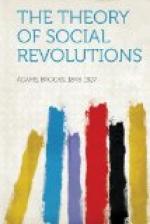And so the Senate did indefinitely postpone the bill.
Matters stood thus when the government brought process to dissolve the Standard Oil Company, as an unlawful combination. The cause was decided on May 15, 1911, the Chief Justice speaking for the majority of the bench, in one of the most suggestive opinions which I have ever read. To me this opinion, like Taney’s opinion in the Charles River Bridge Case, indicates that the tension had reached the breaking point, the court yielding in all directions at once, while the dominant preoccupation of the presiding judge seemed to be to plant his tribunal in such a position that it could so yield, without stultifying itself hopelessly before the legal profession and the public. In striving to reach this position, however, I apprehend that the Chief Justice, unreservedly, crossed the chasm on whose brink American jurists had been shuddering for ninety years. The task the Chief Justice assumed was difficult almost beyond precedent. He proposed to surrender to the vested interests the principle of reasonableness which they demanded, and which the tribunal he represented, together with Congress, had refused to surrender for fifteen years. To pacify the public, which would certainly resent this surrender, he was prepared to punish two hated corporations, while he strove to preserve, so far as he could, the respect of the legal profession and of the public, for the court over which he presided, by maintaining a semblance of consistency.
To accomplish these contradictory results, the Chief Justice began, rather after the manner of Marshall in Marbury v. Madison, by an extra-judicial disquisition. The object of this disquisition was to justify his admission of the evidence of reasonableness as a defence, although it was not needful to decide that such evidence must be admitted in order to dispose of that particular cause. For the Chief Justice very readily agreed that the Standard Oil Company was, in fact, an unreasonable restraint of trade, and must be dissolved, no matter whether it were allowed to prove its reasonable methods or not. Accordingly, he might have contented himself with stating that, admitting for the sake of argument but without approving, all the defendant advanced, he should sustain the government; but to have so disposed of the case would not have suited his purpose. What the Chief Justice had it at heart to do was to surrender a fundamental principle, and yet to appear to make no surrender at all. Hence, he prepared his preliminary and extra-judicial essay on the human reason, of whose precise meaning, I must admit, I still, after many perusals, have grave doubts. I sometimes suspect that the Chief Justice did not wish to be too explicit. So far as I comprehend the Chief Justice, his chain of reasoning amounted to something like this: It was true, he observed, that for fifteen years the Supreme Court had rejected the evidence of reasonableness




